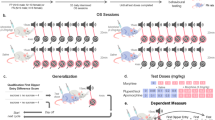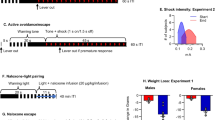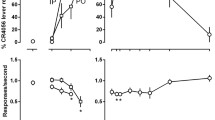Abstract
Rationale
Dopamine D3 receptor-preferring ligands may be able to modify the conditioned reinforcing effects of drug-associated stimuli. In evaluating the effects of these compounds, it is important to clarify the extent to which responding depends on (1) conditioned reinforcement vs. other behavioral mechanisms and (2) dopamine D3 vs. D2 receptor activity.
Objectives
To use behaviorally stringent new-response acquisition procedures to characterize the effects of the D3-preferring agonist, pramipexole, on the conditioned reinforcing effects of a stimulus paired with the opioid agonist, remifentanil.
Methods
First, in Pavlovian conditioning (PAV) sessions, rats received response-independent IV injections of remifentanil and presentations of a light–noise stimulus. In separate groups, injections and stimuli either always co-occurred (“paired PAV”) or occurred with no consistent relationship (“random PAV” control). Next, in instrumental acquisition (ACQ) sessions, all animals could respond in two nose-poke manipulanda: an active nose-poke, which produced the stimulus alone, or an inactive nose-poke. Pramipexole was injected SC prior to ACQ sessions with or without pretreatments of the D3-preferring antagonist, SB-277011A, or the D2-preferring antagonist, L-741,626.
Results
After paired PAV, but not random PAV, rats acquired nose-poke responding during ACQ (i.e., active > inactive). Pramipexole dose-dependently increased active responding without changing inactive responding. Pramipexole-induced increases in responding were blocked by pretreatment with L-741,626, but not SB-277011A.
Conclusions
Pramipexole specifically enhanced remifentanil-conditioned reinforcement: active responding was selectively increased only after the stimulus was paired with remifentanil. Although pramipexole is D3-preferring, the antagonist effects obtained presently suggest an important role for the D2 receptor in opioid-conditioned reinforcement.






Similar content being viewed by others
References
Ashby CR Jr, Paul M, Gardner EL, Heidbreder CA, Hagan JJ (2003) Acute administration of the selective D3 receptor antagonist SB-277011A blocks the acquisition and expression of the conditioned place preference response to heroin in male rats. Synapse 48:154–156. doi:10.1002/syn.10188
Bello EP, Mateo Y, Gelman DM, Noaín D, Shin JH, Low MJ, Alvarez VA, Lovinger DM, Rubinstein M (2011) Cocaine supersensitivity and enhanced motivation for reward in mice lacking dopamine D2 autoreceptors. Nat Neurosci 14:1033–1038. doi:10.1038/nn.2862
Beninger RJ, Ranaldi R (1992) The effects of amphetamine, apomorphine, SKF 38393, quinpirole and bromocriptine on responding for conditioned reward in rats. Behav Pharmacol 3:155–163. doi:10.1097/00008877-199204000-00009
Bertz JW, Woods JH (2013) Acquisition of responding with a remifentanil-associated conditioned reinforcer in the rat. Psychopharmacology (Berlin) 229:235–243. doi:10.1007/s00213-013-3102-0
Burke KA, Franz TM, Miller DN, Schoenbaum G (2007) Conditioned reinforcement can be mediated by either outcome-specific or general affective representations. Front Integr Neurosci 1:2. doi:10.3389/neuro.07.002.2007
Cador M, Taylor JR, Robbins TW (1991) Potentiation of the effects of reward-related stimuli by dopaminergic-dependent mechanisms in the nucleus accumbens. Psychopharmacology (Berlin) 104:377–385. doi:10.1007/BF02246039
Caine SB, Negus SS, Mello NK, Patel S, Bristow L, Kulagowski J, Vallone D, Saiardi A, Borrelli E (2002) Role of dopamine D2-like receptors in cocaine self-administration: studies with D2 receptor mutant mice and novel D2 receptor antagonists. J Neurosci 22:2977–2988
Cervo L, Carnovali F, Stark JA, Mennini T (2003) Cocaine-seeking behavior in response to drug-associated stimuli in rats: involvement of D3 and D2 dopamine receptors. Neuropsychopharmacology 28:1150–1159. doi:10.1038/sj.npp.1300169
Cervo L, Cocco A, Petrella C, Heidbreder CA (2007) Selective antagonism at dopamine D3 receptors attenuates cocaine-seeking behaviour in the rat. Int J Neuropsychopharmacol 10:167–181. doi:10.1017/S1461145705006449
Chang W-L, Breier MR, Yang A, Swerdlow NR (2011) Disparate effects of pramipexole on locomotor activity and sensorimotor gating in Sprague–Dawley rats. Pharmacol Biochem Behav 99:634–638. doi:10.1016/j.pbb.2011.06.002
Collins GT, Woods JH (2009) Influence of conditioned reinforcement on the response-maintaining effects of quinpirole in rats. Behav Pharmacol 20:492–504. doi:10.1097/FBP.0b013e328330ad9b
Collins GT, Witkin JM, Newman AH, Svensson KA, Grundt P, Cao J, Woods JH (2005) Dopamine agonist-induced yawning in rats: a dopamine D3 receptor-mediated behavior. J Pharmacol Exp Ther 314:310–319. doi:10.1124/jpet.105.085472
Collins GT, Newman AH, Grundt P, Rice KC, Husbands SM, Chauvignac C, Cheng J, Wang S, Woods JH (2007) Yawning and hypothermia in rats: effects of dopamine D3 and D2 agonists and antagonists. Psychopharmacology (Berlin) 193:159–170. doi:10.1007/s00213-007- 0766-3
Collins GT, Truccone A, Haji-Abdi F, Newman AH, Grundt P, Rice KC, Husbands SM, Greedy BM, Enguehard-Gueiffier C, Gueiffier A, Chen J, Wang S, Katz JL, Grandy DK, Sunahara RK, Woods JH (2009) Proerectile effects of dopamine D2-like agonists are mediated by the D3 receptor in rats and mice. J Pharmacol Exp Ther 329:210–217. doi:10.1124/jpet.108.144048
Collins GT, Cunningham AR, Chen J, Wang S, Newman AH, Woods JH (2012) Effects of pramipexole on the reinforcing effectiveness of stimuli that were previously paired with cocaine reinforcement in rats. Psychopharmacology (Berlin) 219:123–135. doi:10.1007/s00213-011-2382-5
De Vries TJ, Schoffelmeer ANM, Binnekade R, Raasø H, Vanderschuren LJMJ (2002) Relapse to cocaine- and heroin-seeking behavior mediated by dopamine D2 receptors is time-dependent and associated with behavioral sensitization. Neuropsychopharmacology 26:18–26. doi:10.1016/S0893-133X(01)00293-7
Di Ciano P, Everitt BJ (2004) Conditioned reinforcing properties of stimuli paired with self-administered cocaine, heroin, or sucrose: implications for the persistence of addictive behaviour. Neuropharmacology 47:202–213. doi:10.1016/j.neuropharm.2004.06.005
Di Ciano P, Underwood RJ, Hagan JJ, Everitt BJ (2003) Attenuation of cue-controlled cocaine-seeking by a selective D3 dopamine receptor antagonist SB-277011-A. Neuropsychopharmacology 28:329–338. doi:10.1038/sj.npp.1300148
Dias C, Lachize S, Boilet V, Huitelec E, Cador M (2004) Differential effects of dopaminergic agents on locomotor sensitization and on the reinstatement of cocaine-seeking and food-seeking behaviour. Psychopharmacology (Berlin) 175:414–427. doi:10.1007/s00213-004-1839-1
Dickinson A, Smith J, Mirenowicz J (2000) Dissociation of Pavlovian and instrumental incentive learning under dopamine antagonists. Behav Neurosci 114:468–483
Dockstader CL, Rubinstein M, Grandy DK, Low MJ, van der Kooy D (2001) The D2 receptor is critical in mediating opiate motivation only in opiate-dependent and withdrawn mice. Eur J Neurosci 13:995–1001. doi:10.1046/j.1460-9568.2001.01455.x
Dubrovina NI, Zinov’eva DV (2010) Effects of activation and blockade of dopamine receptors on the extinction of a passive avoidance reaction in mice with a depressive-like state. Neurosci Behav Physiol 40:55–59. doi:10.1007/s11055-009-9226-3
Elmer GI, Pieper JO, Rubinstein M, Low MJ, Grandy DK, Wise RA (2002) Failure of intravenous morphine to serve as an effective instrumental reinforcer in dopamine D2 receptor knock-out mice. J Neurosci 22:RC224
Fuchs RA, Tran-Nguyen LTL, Weber SM, Khroyan TV, Neisewander JL (2002) Effects of 7-OH-DPAT on cocaine-seeking behavior and on re-establishment of cocaine self-administration. Pharmacol Biochem Behav 72:623–632. doi:10.1016/S0091-3057(02)00731-1
Gál K, Gyertyán I (2006) Dopamine D3 as well as D2 receptor ligands attenuate the cue-induced cocaine-seeking in a relapse model in rats. Drug Alcohol Depend 81:63–70. doi:10.1016/j.drugalcdep.2005.05.011
Gilbert JG, Newman AH, Gardner EL, Ashby CR Jr, Heidbreder CA, Pak AC, Peng X-Q, Xi Z-X (2005) Acute administration of SB-277011A, NGB 2904, or BP 897 inhibits cocaine cue-induced reinstatement of drug-seeking behavior in rats: role of dopamine D3 receptors. Synapse 57:17–28. doi:10.1002/syn.20152
Heidbreder C (2013) Rationale in support of the use of selective dopamine D3 receptor antagonists for the pharmacotherapeutic management of substance use disorders. Naunyn Schmiedeberg’s Arch Pharmacol 386:167–176. doi:10.1007/s00210-012-0803-6
Higley AE, Kiefer SW, Li X, Gaál J, Xi Z-X, Gardner EL (2011) Dopamine D3 receptor antagonist SB-277011A inhibits methamphetamine self-administration and methamphetamine- induced reinstatement of drug-seeking in rats. Eur J Pharmacol 659:187–192. doi:10.1016/j.ejphar.2011.02.046
Hitchcott PK, Quinn JJ, Taylor JR (2007) Bidirectional modulation of goal-directed actions by prefrontal cortical dopamine. Cereb Cortex 17:2820–2827. doi:10.1093/cercor/bhm010
Hogarth L, Balleine BW, Corbit LH, Killcross S (2013) Associative learning mechanisms underpinning the transition from recreational drug use to addiction. Ann N Y Acad Sci 1282:12–24. doi:10.1111/j.1749-6632.2012.06768.x
Hutcheson DM, Everitt BJ, Robbins TW, Dickinson A (2001) The role of withdrawal in heroin addiction: enhances reward or promotes avoidance? Nat Neurosci 4:943–947. doi:10.1038/nn0901-943
Institute of Laboratory Animal Research CoLS, National Research Council (2011) Guide for the care and use of laboratory animals, 8th edn. National Academies Press, Washington
Jonkman S, Pelloux Y, Everitt BJ (2012) Drug intake is sufficient, but conditioning is not necessary for the emergence of compulsive cocaine seeking after extended self-administration. Neuropsychopharmacology 37:1612–1619. doi:10.1038/npp.2012.6
Kelleher RT, Gollub LR (1962) A review of positive conditioned reinforcement. J Exp Anal Behav 5:543–597. doi:10.1901/jeab.1962.5-s543
Koob GF, Le Moal M (2008) Neurobiological mechanisms for opponent motivational processes in addiction. Philos Trans R Soc Lond B Biol Sci 363:3113–3123. doi:10.1098/rstb.2008.0094
Kurylo DD, Tanguay S (2003) Effects of quinpirole on behavioral extinction. Physiol Behav 80:1–7. doi:10.1016/S0031-9384(03)00218-X
Lagos P, Scorza C, Monti JM, Jantos H, Reyes-Parada M, Silveira R, Ponzoni A (1998) Effects of the D3 preferring dopamine agonist pramipexole on sleep and waking, locomotor activity and striatal dopamine release in rats. Eur Neuropsychopharmacol 8:113–120. doi:10.1016/S0924-977X(97)00054-0
Le Foll B, Goldberg SR, Sokoloff P (2005) The dopamine D3 receptor and drug dependence: effects on reward or beyond? Neuropharmacology 49:525–541. doi:10.1016/j.neuropharm.2005.04.022
Lex B, Hauber W (2010) The role of nucleus accumbens dopamine in outcome encoding in instrumental and Pavlovian conditioning. Neurobiol Learn Mem 93:283–290. doi:10.1016/j.nlm.2009.11.002
Mackintosh NJ (1974) The psychology of animal learning. Academic, New York
Maj J, Rogóż Z, Skuza G, Kołodziejczyk K (1997) The behavioural effects of pramipexole, a novel dopamine receptor agonist. Eur J Pharmacol 324:31–37. doi:10.1016/S0014-2999(97)00066-6
Maldonado R, Saiardi A, Valverde O, Samad TA, Roques BP, Borrelli E (1997) Absence of opiate rewarding effects in mice lacking dopamine D2 receptors. Nature 388:586–589
Milton AL, Everitt BJ (2010) The psychological and neurochemical mechanisms of drug memory reconsolidation: implications for the treatment of addiction. Eur J Neurosci 31:2308–2319. doi:10.1111/j.1460-9568.2010.07249.x
Min C, Zheng M, Zhang X, Caron MG, Kim KM (2013) Novel roles for β-arrestins in the regulation of pharmacological sequestration to predict agonist-induced desensitization of dopamine D3 receptors. Br J Pharmacol 170:1112–1129. doi:10.1111/bph.12357
Myers KM, Carlezon WA (2010) Extinction of drug- and withdrawal-paired cues in animal models: relevance to the treatment of addiction. Neurosci Biobehav Rev 35:285–302. doi:10.1016/j.neubiorev.2010.01.011
Nader K, LeDoux J (1999) The dopaminergic modulation of fear: quinpirole impairs the recall of emotional memories in rats. Behav Neurosci 113:152–165
O’Brien CP, Gardner EL (2005) Critical assessment of how to study addiction and its treatment: human and non-human animal models. Pharmacol Ther 108:18–58. doi:10.1016/j.pharmthera.2005.06.018
Palmatier MI, Liu X, Matteson GL, Donny EC, Caggiula AR, Sved AF (2007) Conditioned reinforcement in rats established with self-administered nicotine and enhanced by noncontingent nicotine. Psychopharmacology (Berlin) 195:235–243. doi:10.1007/s00213-007-0897-6
Pears A, Parkinson JA, Hopewell L, Everitt BJ, Roberts AC (2003) Lesions of the orbitofrontal but not medial prefrontal cortex disrupt conditioned reinforcement in primates. J Neurosci 23:11189–11201
Peck JA, Ranaldi R (2014) Drug abstinence: exploring animal models and behavioral treatment strategies. Psychopharmacology (Berlin) 231:2045–2058. doi:10.1007/s00213-014-3517-2
Pilla M, Perachon S, Sautel F, Garrido F, Mann A, Wermuth CG, Schwartz J-C, Everitt BJ, Sokoloff P (1999) Selective inhibition of cocaine-seeking behaviour by a partial dopamine D3 receptor agonist. Nature 400:371–375. doi:10.1038/22560
Robinson TE, Berridge KC (2003) Addiction. Annu Rev Psychol 54:25–53. doi:10.1146/annurev.psych.54.101601.145237
Robinson TE, Yager LM, Cogan ES, Saunders BT (2014) On the motivational properties of reward cues: individual differences. Neuropharmacology 76:450–459. doi:10.1016/j.neuropharm.2013.05.040
Ross JT, Corrigall WA, Heidbreder CA, LeSage MG (2007) Effects of the selective dopamine D3 receptor antagonist SB-277011A on the reinforcing effects of nicotine as measured by a progressive-ratio schedule in rats. Eur J Pharmacol 22:173–179. doi:10.1016/j.ejphar.2007.01.004
Schindler CW, Panlilio LV, Goldberg SR (2002) Second-order schedules of drug self- administration in animals. Psychopharmacology (Berlin) 163:327–344. doi:10.1007/s00213-002-1157-4
See RE (2005) Neural substrates of cocaine-cue associations that trigger relapse. Eur J Pharmacol 526:140–146. doi:10.1016/j.ejphar.2005.09.034
Self DW, Barnhart WJ, Lehman DA, Nestler EJ (1996) Opposite modulation of cocaine-seeking behavior by D1- and D2-like dopamine receptor agonists. Science 271:1586–1589. doi:10.1126/science.271.5255.1586
Smith JW, Fetsko LA, Xu R, Wang Y (2002) Dopamine D2L receptor knockout mice display deficits in positive and negative reinforcing properties of morphine and in avoidance learning. Neuroscience 113:755–765. doi:10.1016/S0306-4522(02)00257-9
Sutton MA, Rolfe NG, Beninger RJ (2001) Biphasic effects of 7-OH-DPAT on the acquisition of responding for conditioned reward in rats. Pharmacol Biochem Behav 69:195–200. doi:10.1016/S0091-3057(01)00540-8
Taylor JR, Robbins TW (1984) Enhanced behavioural control by conditioned reinforcers following microinjections of d-amphetamine into the nucleus accumbens. Psychopharmacology (Berlin) 84:405–412. doi:10.1007/BF00555222
Taylor JR, Olausson P, Quinn JJ, Torregrossa MM (2009) Targeting extinction and reconsolidation mechanisms to combat the impact of drug cues on addiction. Neuropharmacology 56:186–195. doi:10.1016/j.neuropharm.2008.07.027
Trifilieff P, Feng B, Urizar E, Winiger V, Ward RD, Taylor KM, Martinez D, Moore H, Balsam PD, Simpson EH, Javitch JA (2013) Increasing dopamine D2 receptor expression in the adult nucleus accumbens enhances motivation. Mol Psychiatry 18:1025–1033. doi:10.1038/mp.2013.57
Troisi JR 2nd (2013) Perhaps more consideration of Pavlovian–operant interaction may improve the clinical efficacy of behaviorally based drug treatment programs. Psychol Rec 63:863–894. doi:10.11133.j.tpr.2013.63.4.010
Wassum KM, Ostlund SB, Balleine BW, Maidment NT (2011) Differential dependence of Pavlovian incentive motivation and instrumental incentive learning processes on dopamine signaling. Learn Mem 18:475–483. doi:10.1101/lm.2229311
Wike EL (1966) Secondary reinforcement: selected experiments. Harper & Row, New York
Williams BA (1994) Conditioned reinforcement: experimental and theoretical issues. Behav Anal 17:261–285
Wolterink G, Phillips G, Cador M, Donselaar-Wolterink I, Robbins TW, Everitt BJ (1993) Relative roles of ventral striatal D1 and D2 dopamine receptors in responding with conditioned reinforcement. Psychopharmacology (Berlin) 110:355–364. doi:10.1007/BF02251293
Zimmer BA, Chiodo KA, Roberts DCS (2014) Reduction of the reinforcing effectiveness of cocaine by continuous D-amphetamine treatment in rats: importance of active self-administration during treatment period. Psychopharmacology (Berlin) 231:949–954. doi:10.1007/s00213-013-3305-4
Acknowledgments
We thank Davina Barron, Alyssa Cunningham, and Tomas Davaloz for their excellent technical assistance. We thank Gail Winger for her comments on an earlier draft of the manuscript. This research was supported by the National Institute on Drug Abuse under grants T32DA07268, R01DA020669, R01DA024897, and R01DA032943 and by the National Science Foundation Graduate Research Fellowship Program under grant DGE 0718128.
Conflict of interest
The authors declare no conflicts of interest. All experiments comply with the current laws of the United States, the country in which they were performed.
Author information
Authors and Affiliations
Corresponding author
Rights and permissions
About this article
Cite this article
Bertz, J.W., Chen, J. & Woods, J.H. Effects of pramipexole on the acquisition of responding with opioid-conditioned reinforcement in the rat. Psychopharmacology 232, 209–221 (2015). https://doi.org/10.1007/s00213-014-3659-2
Received:
Accepted:
Published:
Issue Date:
DOI: https://doi.org/10.1007/s00213-014-3659-2




